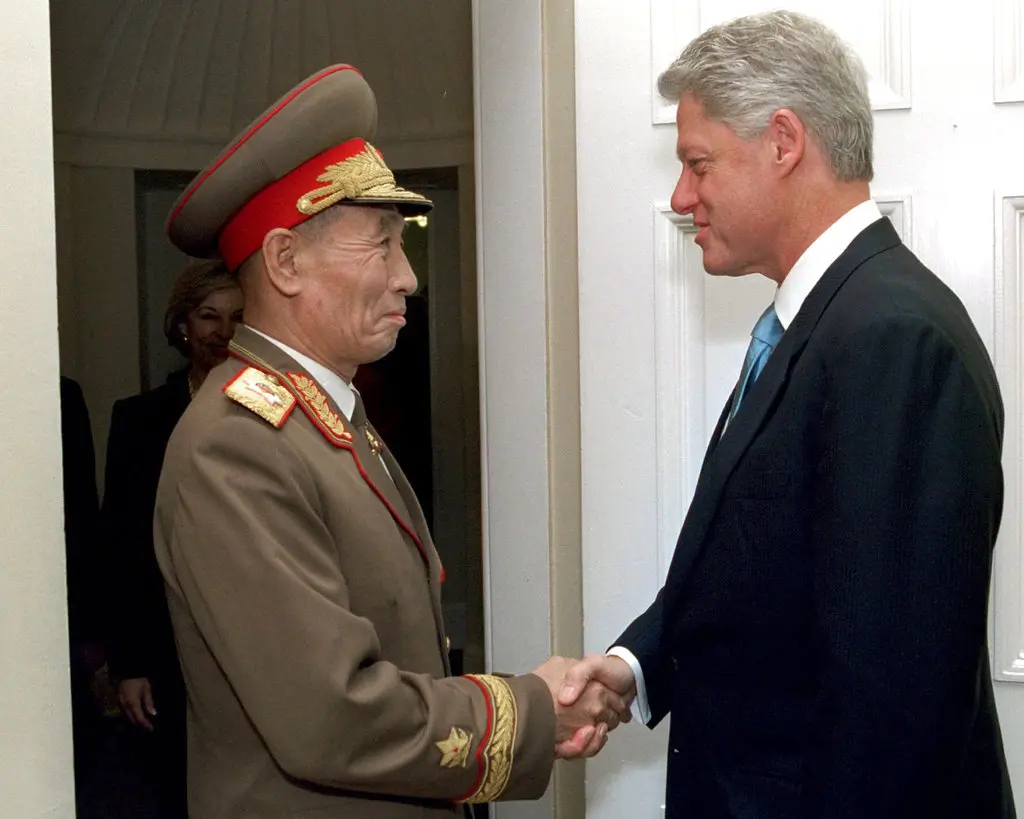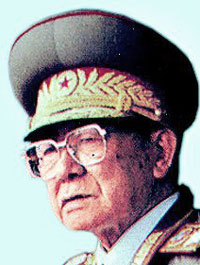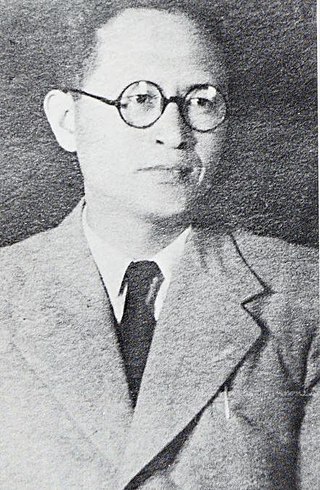
Jo Myong-lok was a North Korean military officer who held the military rank Chasu. In 1998, he was appointed First Vice-Chairman of the National Defence Commission of North Korea, Director of the Korean People's Army General Political Bureau. Previously, he was the commander of the air defence forces.

Parliamentary elections were held in North Korea on 8 March 2009 to elect the members of the 12th Supreme People's Assembly. They were originally scheduled to be held in August 2008 but were postponed for unknown reasons. Observers of North Korea speculated that it was in relation to Kim Jong-il's ill health.
Parliamentary elections were held in North Korea on 3 August 2003. Representatives were elected for five-year terms to all 687 seats of the Supreme People's Assembly, and also to 26,650 positions in city, county, and provincial People's Assemblies. All candidates were members of the three parties constituting the Democratic Front for the Reunification of the Fatherland.
Parliamentary elections were held in North Korea on 2 November 1986. 655 Deputies were elected to the parliament.

Marshal Choe Kwang was a prominent military leader in North Korea.

Parliamentary elections were held in North Korea on 25 August 1948 to elect the members of the 1st Supreme People's Assembly. Organised by the People's Committee of North Korea, the elections saw 572 deputies elected, of which 212 were from North Korea and 360 from South Korea.

Parliamentary elections were held in North Korea on 27 August 1957 to elect members of the 2nd Supreme People's Assembly. Voters were presented with a single list from the Democratic Front for the Reunification of the Fatherland, dominated by the Workers' Party of Korea.

Parliamentary elections were held in North Korea on 8 October 1962 to elect the members of the 3rd Supreme People's Assembly. Only one candidate was presented in each constituency, all of which were selected by the Workers' Party of Korea, although some ran under the banner of other parties or state organisations to give the illusion of democracy. Voter turnout was reported to be 100%, with all reportedly voting in favour of the candidates presented.
Parliamentary elections were held in North Korea on 26 July 1998. 687 deputies were elected to the tenth Supreme People's Assembly. There was only one nominated candidate per constituency - 687 candidates for 687 seats. According to the state news agency KCNA, the turnout rate was 99.85%, and 100% of participating voters cast their ballots in favour of the registered candidates. About two thirds of the deputies were new, and deputies with a military background reportedly doubled in number. Kim Jong-il was unanimously elected in constituency n°666. According to a Rodong Sinmun editorial, this proved "how deep the Korean people's trust in Kim Jong Il is and how powerful and solid the monolithic unity of the people around him in one thought and purpose and with moral obligation is."

Kim Il-sung died of a sudden heart attack on the early morning of 8 July 1994 at age 82. North Korea's government did not report the death for more than 34 hours after it occurred. An official mourning period was declared from 8–17 July, during which the national flag was flown at half mast throughout the country, and all forms of amusement and dancing were prohibited.
Parliamentary elections were held in North Korea on 9 March 2014 to elect the members of the 13th Supreme People's Assembly.

The 1st Congress of the Workers' Party of North Korea (WPNK)(Korean: 북조선로동당 제 1차 대회) was held in Pyongyang, North Korea, from 28 to 30 August 1946, and established the WPNK. The congress is the highest organ of the party, and is stipulated to be held every four years. A total of 801 delegates represented the party's 336,399 members. The 1st Central Committee, elected by the congress, elected Kim Tu-bong as WPNK Chairman, Kim Il-sung and Chu Yong-ha as deputy chairmen.

The 2nd Congress of the Workers' Party of North Korea(Korean: 북조선로동당 제 2차 대회) (WPNK) was held in Pyongyang, North Korea, from 27–30 March 1948. The congress is the highest organ of the party, and is stipulated to be held every four years. 999 delegates represented the party's 750,000 members. The 2nd Central Committee, elected by the congress, reelected Kim Tu-bong as WPNK Chairman, and Kim Il-sung and Chu Yong-ha as deputy chairmen.

Chu Yong-ha was a North Korean politician and diplomat. Chu was elected into several posts in the Workers' Party of North Korea, the predecessor of the Workers' Party of Korea, in its early days. Chu was the target of plots ensuing from factional strife within the party. As a member of the Domestic faction, Chu was opposed by the Guerrilla, Soviet and Yan'an factions.

The 10th Supreme People's Assembly of North Korea was in session from 1998 until 2003. It consisted of 687 deputies, and held six sessions.

The 2nd Central Committee of the Workers' Party of Korea (WPK) was elected at the 2nd Congress on 30 March 1948, and remained in session until the election of the 3rd Central Committee on 29 April 1956. In between party congresses and specially convened conferences the Central Committee is the highest decision-making institution in the WPK and North Korea. The 2nd Central Committee was not a permanent institution and delegated day-to-day work to elected bodies, such as the Political Committee, the Standing Committee, the Organisation Committee and the Inspection Committee in this case. It convened meetings, known as "Plenary Session of the [term] Central Committee", to discuss major policies. Only full members had the right to vote, but if a full member could not attend a plenary session, the person's spot was taken over by an alternate. Plenary session could also be attended by non-members, such meetings are known as "Enlarged Plenary Session", to participate in the committee's discussions. During its tenure it held five plenary sessions, one enlarged session, seven joint plenary sessions and four stand-alone plenums.

Parliamentary elections were held in North Korea on 10 March 2019 to elect the members of the 14th Supreme People's Assembly. The elections were announced on 6 January 2019. With only one candidate on the ballot in each constituency, outside observers described it as a show election. 687 candidates for the DPRK deputies to the SPA were elected. Kim Jong-un did not stand for election, marking the first time that a North Korean leader did not participate as a candidate.
The 3rd Conference of the Workers' Party of Korea was held in Pyongyang on September 28, 2010. The meeting elected the highest authority of the Workers' Party of Korea, and revised the party charter. North Korean leader Kim Jong Il also attended the meeting. A plenary meeting of the Central Auditing Committee of the Workers' Party of Korea and the September 2010 plenary meeting of the Central Committee of the Workers' Party of Korea were held earlier on the same day.
The 1st Standing Committee of the Workers' Party of North Korea (WPNK)(1차 북조선로동당 상무위원회) was elected at the 1st WPNK Congress held in August 1946. It consisted of 13 members and remained active until the election of the 2nd Standing Committee by the 1st Plenary Session of the 2nd Central Committee on 30 March 1948. In between sessions of the Standing Committee, the Political Committee met in its place.
The 1st Central Inspection Commission of the Workers' Party of South Korea (WPSK)(남조선로동당 중앙감찰위원회) was elected at the 1st WPSK Congress held in November 1946. It consisted of 11 members and remained active until the merger of WPSK and the Workers' Party of North Korea on 30 June 1949.








